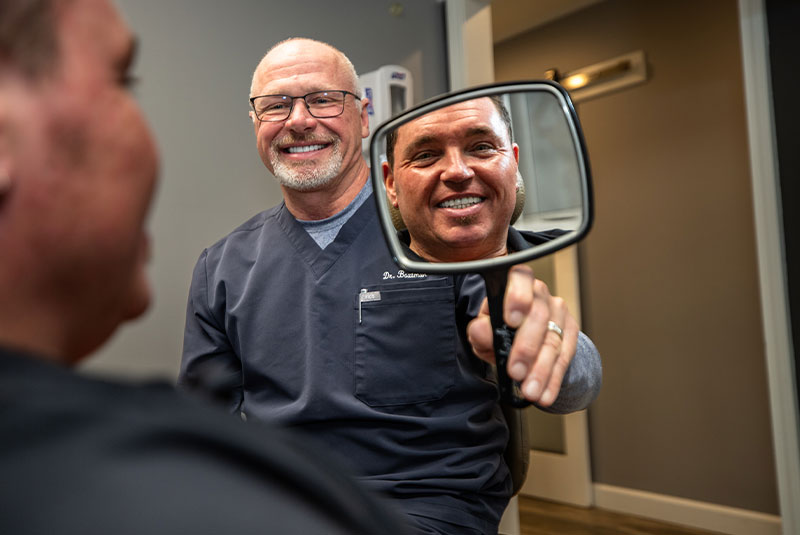

It’s never wise to ignore an acute or chronic painful dental problem because delaying treatment can lead to permanent damage that impacts your oral health, general health and lead to more extensive and costly work later on. But sometimes, it’s hard to distinguish between an issue that can wait until your next scheduled appointment and a problem that requires urgent dental care. Persistent severe oral pain or bleeding are always a sign of an emergency. If you knocked out a permanent tooth, emergency dentistry in Troy, IL can spell the difference between saving your tooth and extraction. A severe toothache can be the sign of an abscess or infection that can become life threatening if left untreated, so this definitely qualifies as a dental emergency. Dental emergencies can cause stress, disrupt your schedule and make your life painful. Finding a reliable emergency dentist near you before the unexpected strikes is a proactive way to be prepared. Rest assured, the compassionate team at Troy Family Dentistry is here to alleviate your pain and restore your smile and health with urgent dental care in Troy, IL!
We offer a variety of emergency dentistry treatments at Troy Family Dentistry including root canals, repair of a loose or lost filling, and treatment of painful infections.

A tooth abscess is a collection of pus caused by a bacterial infection. The most obvious symptom is intense throbbing pain in the affected area that starts suddenly and gradually worsens. Other symptoms include sensitivity to hot or cold food and beverages and facial redness or swelling. An emergency root canal is the first-line treatment for an abscessed tooth because the infection has nearly always infiltrated the dental pulp.
Toothaches can be more than a painful nuisance—this is your body’s way of telling you something isn’t right in your mouth. When you experience sudden and unexplainable tooth pain, call Troy Family Dentistry and we’ll fit you into our schedule. Our qualified emergency dentist Dr. Boatman Jr. has the advanced skills and gentle touch to diagnose and treat the underlying issue. If the toothache is cause by infected dental pulp, an emergency root canal can alleviate the pain and often save the tooth from extraction.
In some cases, it’s obvious you cracked a tooth, for example if you bite on something hard and part of your tooth around a filling breaks off. In other cases, a crack can be asymptomatic or produce fleeting symptoms that you may ignore. If the crack extends from the chewing surface of your tooth vertically down into the pulp, a root canal can prevent further damage. But if the crack extends below the gum line, it’s no longer treatable and will require extraction, followed by a dental implant or bridge. Other types of damage include craze lines, fractured cusps, split teeth and vertical root fractures.
The term luxated tooth refers to dislocation or dislodgement of a tooth from its normal position. During an injury, the tooth may be pushed forward, backward or sideways partially out of or into the socket. When trauma has caused a tooth to be dislodged from its normal position, it needs to be replaced gently and as soon as possible. At Troy Family Dentistry, the first step is for Dr. Boatman Jr. to perform tests to determine the extent of the damage. The goal of immediate treatment such as splinting is to limit further damage to the periodontal ligament and enable the best possible healing.
It’s possible to re-implant and save a knocked out tooth with emergency dentistry, but time is of the essence! Call Troy Family Dentistry right away and we’ll talk you through what to do until you arrive at our office. This starts with carefully picking up the tooth by the crown, taking care not to touch the root, then gently rinsing it. If you can’t reinsert the tooth in the socket, place it in a container with milk and bring it with you. Management of a knocked out tooth in Troy, IL focuses on replanting the tooth, preferably within 20–40 minutes of injury. Emergency intervention minimizes periodontal damage and prevents infection of the pulp tissue.
Gums that won’t stop bleeding, especially if accompanied by pain and swelling, can indicate an underlying dental or health issue. Likewise, if your mouth or jaw suddenly become swollen for no apparent reason, call Troy Family Dentistry for emergency dentistry in Troy, IL. These symptoms could be caused by an infection, irritation to your lymph nodes or another serious issue that requires immediate attention from a dental professional.
After a tooth extraction, a protective blood clot typically forms over the underlying bone and nerves. If the blood clot doesn’t form or gets dislodged, sensitive underlying tissue is exposed. When nerves are exposed, this can be an excruciating experience that only gets worse if you delay treatment. To alleviate severe pain, call Troy Family Dentistry immediately and we’ll fit you into our schedule. Treatment involves gently rinsing out the socket, then packing it with a medicated gauze pad. This process may need to be repeated until a blood clot forms and your pain subsides.

Making you comfortable and helping you heal are always our top priorities.
At Troy Family Dentistry, our modern treatment rooms are fully equipped with advanced dental technology to serve you. These tools help us quickly and accurately diagnose any issues and deliver the necessary emergency dentistry you need in Troy, IL. Our facilities and equipment are fully compliant with the most up-to-date safety standards including strict sterilization guidelines for your health, safety, and peace of mind. To ease your discomfort throughout your visit, we’re able to offer a custom level of sedation dentistry to put you at ease and allow you to finally relax. Making you comfortable and helping you heal are always our top priorities.

If you’re experiencing head or neck pain, bleeding uncontrollably, feeling dizzy or incurred severe head trauma, it’s crucial to seek immediate medical attention by calling 911 or getting transported to the nearest medical facility. Medical personnel are best equipped to assist you with these types of urgent symptoms.
I understand the information disclosed in this form may be subject to re-disclosure and may no longer be protected by HIPAA privacy regulations and the HITECH Act.
I understand the information disclosed in this form may be subject to re-disclosure and may no longer be protected by HIPAA privacy regulations and the HITECH Act.
